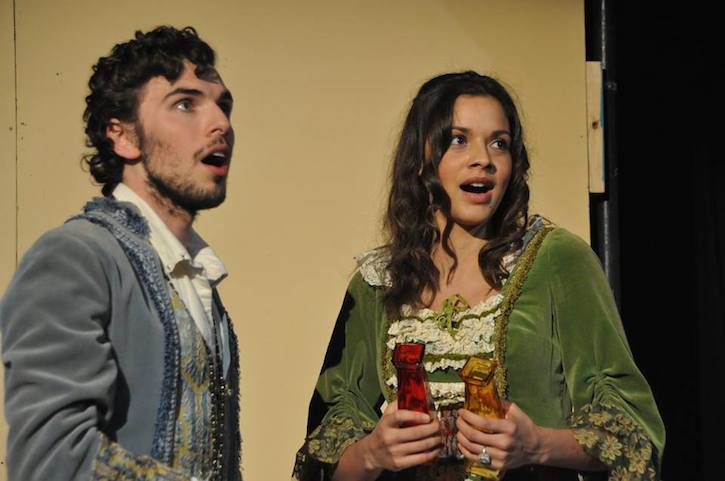
The St. Olaf Lyric Theatre Department premiered Fabrizio’s Comet – an operetta composed by St. Olaf Professor of Music James McKeel – from Oct. 16 through 18. The operetta transported the audience into a night of magical telescopes and enchanted violins, forbidden love, secrets and sainthood.
Based on the novel Fabrizio’s Return by Canadian author Mark Frutkin, McKeel’s operetta Fabrizio’s Comet was the culmination of two years of work adapting the novel to the stage by writing the libretto and composing the music. Frutkin traveled to St. Olaf to attend the final rehearsals and performance.
An operetta differs from an opera in that it tends to be shorter and lighter, both in terms of music and subject matter. The program offered the following synopsis:
“When a skeptical 18th-century devil’s advocate is sent from Rome to judge the sainthood candidacy of a much revered 17th-century priest and healer from the town of Cremona, Italy, he soon finds himself caught up in the miraculous tales and secret life of the man called Don Fabrizio Cambiati.
Through the magic of Halley’s Comet, time travel, lusty elixirs, forbidden love and a town bent on having its own saint, the devil’s advocate soon finds himself on the same perilous path as the priest he was sent to judge.”
Performed in Urness Recital Hall, a colorful set and period costumes gave the operetta a warm, romantic atmosphere. The main portion of the stage depicted the piazza in Cremona, Italy, though a corner represented Don Fabrizio’s study. A projection of a comet traveling around the upper walls conveyed the wonder and magic at the heart of the story. In the second act, the use of candlelight on a darkened stage emphasized the moments of uncertainty and internal conflict, creating seriousness and intensity in an otherwise funny, light plot.
Fabrizio’s Comet also showcased the talent of St. Olaf’s many student singers and musicians. The cast included about twenty students. Eric Broker ’15 played the role of Don Fabrizio and Harrison Hintzche ’16 played the Devil’s Advocate, sent to investigate Fabrizio’s candidacy for sainthood. Other characters included several generations of Dukes and Duchesses of Cremona, the inhabitants of the city and a group of commedia dell’arte players led by the narrator, Mountebank, played by Wenie Lado ’16.
In the seventeenth century, when the Duchess of Crimona Chloe Elzey ’15 comes to him seeking a cure for infertility, Fabrizio falls in love, compromising his prospects for sainthood to help her. A century later, the Advocate sent to uncover Fabrizio’s secret finds himself in a similarly difficult position when he falls in love with Elettra Danielle Long ’16, the great-great-granddaughter of Fabrizio’s Duchess. Observing Halley’s Comet through his telescope, Fabrizio has the opportunity to observe the Advocate 76 years into the future. In the end, the magic of the comet thwarts the dire consequences facing the lovers and ensures a happy ending for all.
Despite the narrator Mountebank’s efforts to guide the audience through the many changes in time, it became difficult to follow the jumps between centuries and decipher the boundaries of the commedia dell’arte troupe’s play within the operetta. Despite some confusion, the music – memorable for its rich range of witty, wistful and fearful emotions – carried the production. “When Priests Become Lovers,” a quartet sung by both couples, stood out as a particularly beautiful song. The audience members found themselves humming along during the final reprise of “The Miracles of Cambiati” as the cast exited the stage after their final bow: “Cambiati, Cambiati, Fabrizio Cambiati! We love to sing of his miracles!”
The performance was recorded and is archived on the St. Olaf web site.
chotlos@stolaf.edu
Photo courtesy of Kelly Leung.

